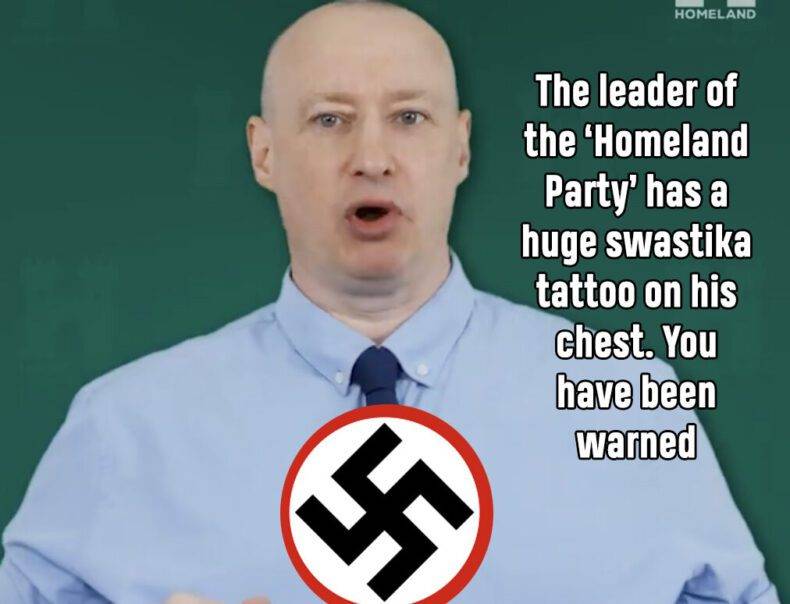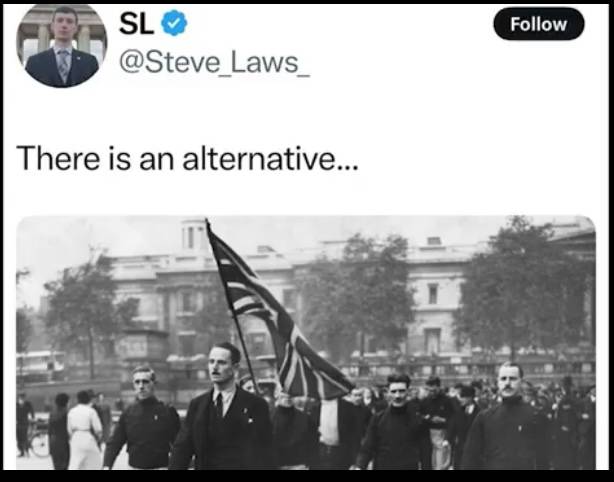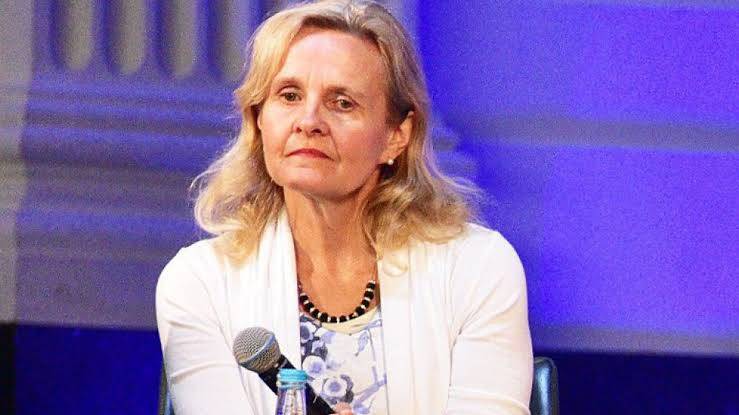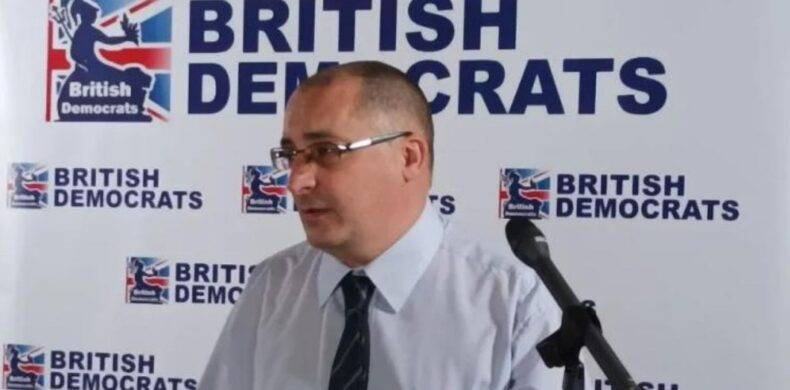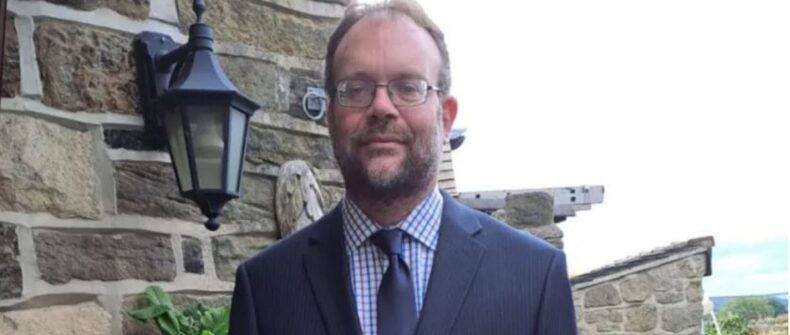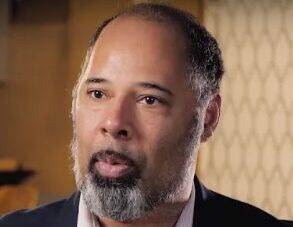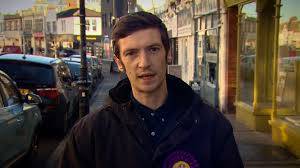
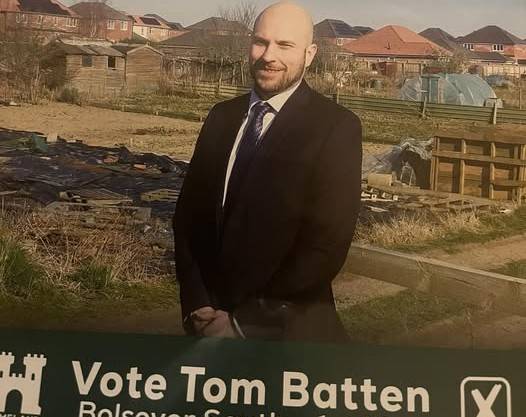

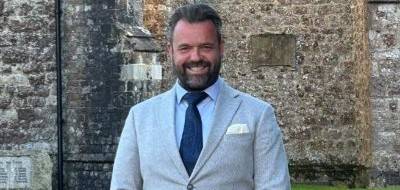
Britain’s fastest growing far-right party Homeland, led by an ex-BNP organiser with a swastika tattoo on his chest but now advertising itself as the voice of “sensible nationalism” will have just four candidates nationwide at the local elections on 1 May.
Party leader Kenny Smith has spent recent weeks in a series of online rows with his ex-BNP colleagues Mark Collett of Patriotic Alternative and Paul Golding of Britain First.
Something dodgy about Kenny
They seem convinced there is something dodgy about Kenny. Collett has attacked him as a state asset, while Golding is putting it about that he is a closet nazi working as an anti-fascist informant. Work that one out…
Homeland’s big focus later this month is on a conference where they will welcome Renaud Camus (a French author who invented the racist slogan “great replacement”), and a representative from Germany’s far-right party AfD, which Smith and other Homeland leaders recently visited in Berlin.
Admiration for Oswald Mosley
That conference is the weekend before the local elections, where Smith’s highest profile candidate is Steve Laws in Folkestone East, Kent. Laws made a name for himself with online films attacking asylum seekers, but during the past year or two has become an increasingly extreme figure even inside Homeland.
Britain First leader Paul Golding recently pointed out Laws’ declared admiration for Oswald Mosley.
He is one of two Homeland candidates in Kent. The other is Simon Bennett in Maidstone Rural East. Searchlight understands that this is not either of the two Simon Bennetts who were once well known in the BNP. The Homeland Bennett appears to be some sort of religious fanatic.
These defectors were disillusioned by Collett’s failure to register as a political party and PA’s consequent inability to stand in elections. That’s why there has been some surprise at Homeland’s failure during almost two years of existence to fight more than one serious election.
Homeland’s candidate in Deepings West & Rural, Lincolnshire, is another notorious conspiracy theorist Andrew Piper, who like many Homeland members left the rival nazi group Patriotic Alternative to join Smith’s venture.
Disillusioned by Collett’s failure
These defectors were disillusioned by Collett’s failure to register as a political party and PA’s consequent inability to stand in elections. That’s why there has been some surprise at Homeland’s failure during almost two years of existence to fight more than one serious election.
Even now, after months of much-hyped growth mainly at PA’s expense, but also some from Britain First and a few of Reform’s most extreme racists, Homeland has only been able to manage four candidates, but even this is by far the biggest electoral effort in their short history.
Conning the voters
The fourth is in Bolsover, Derbyshire, part of Homeland’s most active region in the East Midlands. Tom Batten used to be East Midlands media officer for PA. On 1 May he will try to con Bolsover’s voters by adding to Homeland’s ballot paper description a slogan about protecting green belt.
Even though Homeland’s electoral presence might seem insignificant, it’s important for anti-fascists to expose nazis like Batten who try to co-opt green ideas. There’s a long history of such efforts on the British far right, including various ‘green’ fronts set up by National Front factions in the 1980s.
Almost totally extinct
Speaking of the NF, readers would be forgiven for thinking the party was totally extinct, and that’s almost correct. But one of their perennial candidates is standing again this year as the NF’s sole representative on 2025’s council ballot papers, Tim Knowles in Codnor, Aldercar, Langley Mill and Loscoe (yes that really is just one country council division!), Derbyshire.
This is part of the Heanor area which for decades has been a regular hotspot for various forms of far-right activity.
The English Democrats are another party heading for extinction, kept going mainly by the wealth of their founder and leader, Essex solicitor Robin Tilbrook.
The ED manifesto is “civic nationalist”, but Tilbrook has attempted several alliances over the years with nazis including ex-BNP election supremo Eddy Butler, PA’s Mark Collett, and Heritage & Destiny’s Mark Cotterill.
This year there’s just one ED council candidate, in Boston Coastal, Lincolnshire, though the party is also fighting the Runcorn & Helsby parliamentary by-election. Their candidate is Catherine Blaiklock, a former chum of Nigel Farage and founder of the Brexit and Reform parties.
While the EDs are in decline, another far right party with just one candidate is an outfit that never really got off the ground at all. The National Housing Party is fighting Hillmorton, Warwickshire.
The British Democrats aren’t quite so feeble as the NHP, but are an increasingly elderly irrelevance in a far-right scene dominated by a three-way split between former comrades in PA, Homeland, and Alek Yerbury’s National Rebirth Party. (Yerbury, in case readers were wondering, has said from the start that he isn’t interested in local elections.)
This year the Brit Dems have three council candidates (including ex-BNP official Lawrence Rustem in Maidstone SE, Kent), as well as contesting the Doncaster mayoralty, with candidate Frank Calladine.
UKIP has fallen faster and further than any other party on the right. Searchlight readers will know the story of its collapse, and the evidence is now there for all to see. UKIP will have only 13 candidates nationwide, and seems now to have only one fairly strong area, Staffordshire, where it has five candidates, four of them in Tamworth.
While UKIP flounders, it has been overtaken by one of its splinter groups. The Heritage Party, led by former UKIP leadership candidate and anti-vaxx conspiracy theorist David Kurten, has 24 candidates this year with particular strength in Devon (eight candidates) and Kent (five candidates).
Another UKIP splinter that again has focused on pandemic-related and other conspiracy theories is the Alliance for Democracy & Freedom. They have six candidates nationwide, two of them in St Anne’s, near Blackpool, Lancashire.
And spare a thought for Paul Golding, even though he would rather you spared him a fiver. There was a time when Golding and his party Britain First were the biggest noise on the post-BNP right. This year they don’t have a single council candidate. But it’s a ‘good strategic decision’ so it won’t stop his fundraising emails.

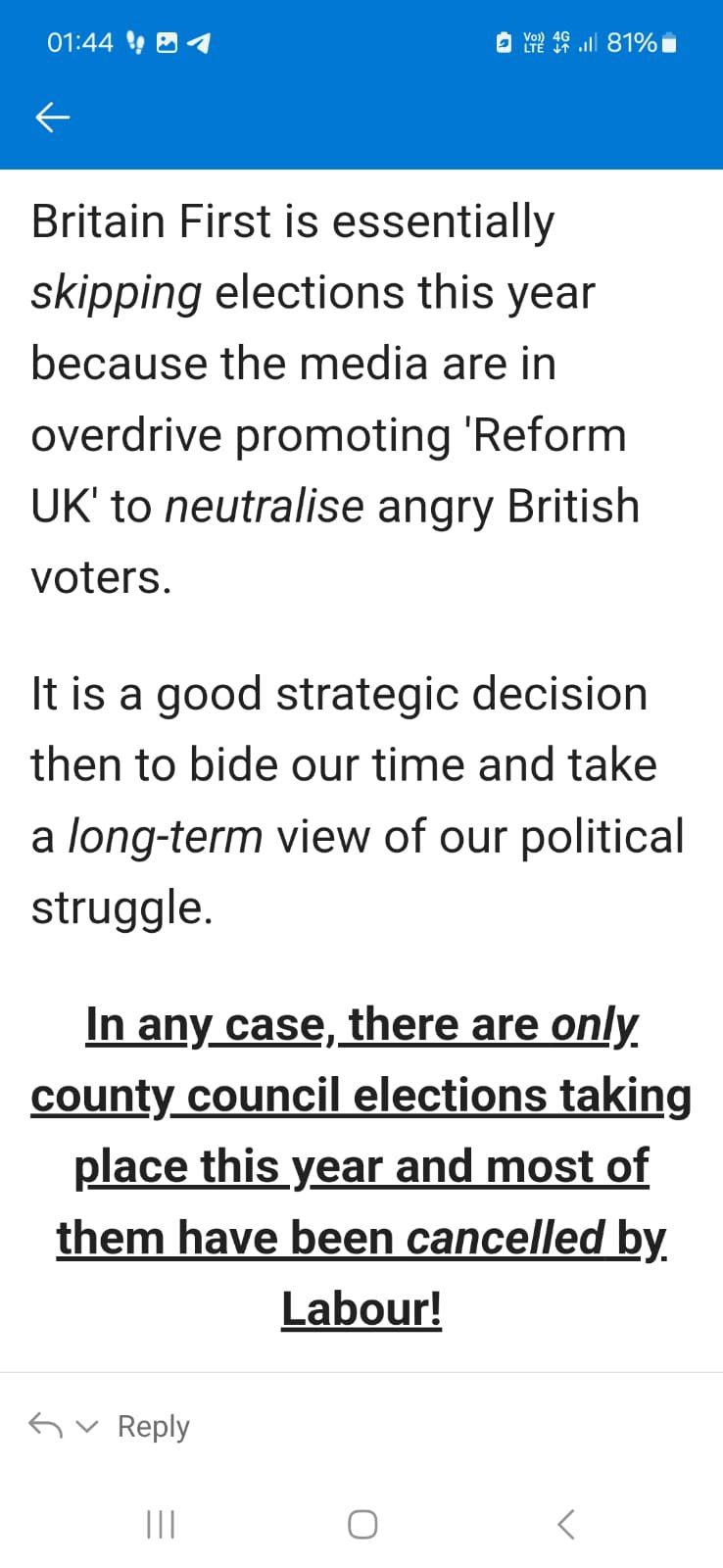
The headlines on 1 May will be about how well or badly Reform UK has polled. Some pundits are already predicting they will be the largest party on some councils. But recent events have shown the importance of monitoring other movements whose leaders will swoop like vultures if Farage’s party continues to suffer splits and defections.
Elections are only one aspect of the subversive danger posed by far-right movements, but Searchlight will continue to monitor the progress of the various parties and factions as British fascists continue their slow post-BNP evolution.
